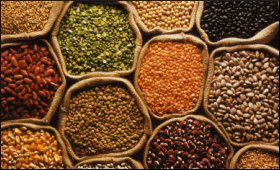|

|
Traders body urges stock limit on importers to curb pulse prices
|
|

|
|
| Top Stories |
 |
|
|
|
SME Times News Bureau | 02 May, 2016
The Confederation of All India Traders (CAIT) said on Sunday that in order to check the phenomenal rise in prices of pulses, the government should impose stock limits on first importers and allow only domestic process houses to import foodgrain and pulses.
"CAIT has suggested that the price level can be maintained reasonably only when MNCs, FDI and corporate sector (are) kept out from foodgrain and pulses sector. We have suggested to impose stock limit on first importer and a clause of compulsory sale in 15 days of arrival of goods in the country," CAIT said in a letter to Finance Minister Arun Jaitley
Blaming MNCs and big retailers for the high prices of pulses, the traders' body also suggested that only domestic process houses be allowed to import foodgrain and pulses.
"Whenever there is high increase of prices in foodgrain and pulses, government takes immediate action on small whole-sellers and processing units and no action is taken against hoarding of big retailers, MNCs," CAIT national president B.C.Bhartia and secretary general Praveen Khandelwal said in a joint statement, adding that big companies form a cartel and manage the prices of pulses.
"Another important factor of price escalation is online trading and NCDEX operations where the speculators, by paying a nominal amount, enter into an agreement of future purchase in huge quantity at a higher price which forces an automatic increase in current prices," they added.
CAIT alleged that MNCS, taking advantage of shortage in India, dispatch goods from Myanmar, Africa, Canada and other markets and inflate the prices exorbitantly "through a strategy to increase local price and sell their products at such higher price and always maintain a shortage, resulting in upsurge in prices to their advantage".
India had imported 5.79 million tonnes of pulses in the last fiscal, compared to 4.58 MT during 2014-15.
|
|
|
| |
|
|
|
|
|
|
|
|
|
|
|
|
|
|
| |
| Customs Exchange Rates |
| Currency |
Import |
Export |
US Dollar
|
66.20
|
64.50 |
UK Pound
|
87.50
|
84.65 |
Euro
|
78.25
|
75.65 |
| Japanese
Yen |
58.85 |
56.85 |
| As on 13 Aug, 2022 |
|
|
| Daily Poll |
 |
 |
| PM Modi's recent US visit to redefine India-US bilateral relations |
|
|
|
|
|
| Commented Stories |
 |
|
|
|
|
|
| |
|